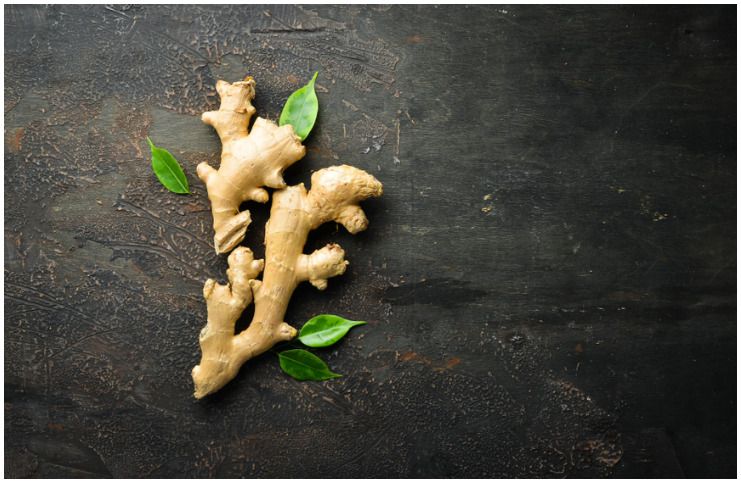Use Ginger Root Tea for Constipation, Diarrhea, Flu, or Upset Stomach:
The spice ginger is the underground rhizome of the ginger plant (Zingiber officinale).
The plant’s botanical name is believed to be derived from its Sanskrit name, “singabera,” which translates as “horn-shaped,” a physical aspect that ginger reflects. It is a perennial plant and a spice that belongs to the Zingiberaceae family, which includes cardamom, turmeric, and galangal.
Native to southeastern Asia, India, and China, the spice has been renowned for millennia in many areas throughout the world, and it has been an integral component of the diet and valued for its culinary, aromatic, and medicinal properties for thousands of years.
Chinese texts from the 4th century BC describe this amazing spice as a natural remedy for treating nausea, stomach issues, diarrhea, toothaches, cholera, flu, menstrual cramps, and rheumatism.
Chemical composition (100g)
Carbohydrate – 17.77 g, dietary fiber – 2 g, protein – 1.82 g, sugars – 1.7 g, sodium – 13 mg, vitamin B2 – 0.034 mg, vitamin B3 – 0.75 mg, vitamin B6 – 0.16 mg, vitamin C – 5 mg, calcium – 16 mg, Iron – 0.6 mg, potassium – 415 mg, magnesium – 43 mg, phosphorus – 34 mg, zinc – 0.34 mg, folate – 11 mcg, Iron – 0.6 mg. In addition, it contains gingerol, which is the active component, related to capsaicin.
Health Benefits
Upset stomach
One of ginger’s greatest claims to fame is its ability to fight nausea, and drinking the tea may help settle your stomach when you feel ill.
Numerous studies suggest that it helps relieve morning sickness and motion sickness, as well as nausea induced by surgery or chemotherapy, according to the University of Maryland Medical Center. (1)
Reduces inflammation
The spice has been used for centuries to treat inflammatory conditions and reduce inflammation. A 2011 research published in Cancer Prevention Research Journal concluded that a ginger root supplement administered to volunteer participants decreased inflammation markers in the colon after one month.
Scientists in the study explained that by reducing inflammation, the risk of colon cancer is also likely to decrease. (2)
Ginger root tea for constipation, indigestion, and nausea
Nausea and vomiting commonly occur as symptoms of a body disorder. This tea provides the best relief mechanism. Furthermore, if you have a motion sickness tendency, you can drink a cup of tea prior to travel to prevent nausea.
It can also help cure the vomiting related to pregnancy and chemotherapy, which is a relief during that period. It eases the pain and uneasiness of an upset stomach.
Acid reflux
Acid reflux happens when some of the acidic stomach contents go back up into the esophagus.
In a 2007 study published in the journal Molecular Research and Food Nutrition, by the Department of Biochemistry and Nutrition, Central Food Technological Research Institute, India, researchers compared the anti-Helicobacter pylori and anti-ulcer properties of this spice and conventional acid-blockers like Lansoprazole (belongs to a group of drugs called proton pump inhibitors).
Surprisingly, Zingiber officinale performed 6 to 8 times better than the drugs. Rather than interfering with or removing the stomach acid barrier, the plant inhibits acid reflux and contains potent proteolytic enzymes. (3)
Flu
It is a natural remedy used for curing flu (both respiratory and stomach flu), without any side effects and gives long-lasting results.
It has potent natural antiviral and antibacterial properties that help fight against the flu virus, getting rid of it from the body and thereby giving you complete relief from influenza. It has oleoresins (a naturally occurring mixture of essential oils and a resin) that help a lot in preventing excess mucus and fighting viral infection.
Diarrhea
Each year, American adults experience, on average, one bout of acute diarrhea – passing loose stools for 1 to 2 days. Diarrhea is caused by an increased secretion of fluid into the intestine, rapid passage of stool through the intestine, or reduced absorption of fluid from the intestine.
Complications of diarrhea include electrolyte (mineral) abnormalities, dehydration, and irritation of the anus. Fresh ginger empowers the stomach by strengthening the inner-outer part and minimizes food stagnation or pollution, hence reducing or eliminating diarrhea.
Cancer prevention
In 2003, working with mice without immune systems, the University of Minnesota researchers concluded that 3 weekly feedings of [6]-gingerol delayed the growth of colorectal cancer cells. (4) In 2006, scientists from the University of Michigan confirmed these results with ovarian cancer.
In fact, they found that „Ginger treatment of cultured ovarian cancer cells induced profound growth inhibition in all cell lines tested.” Moreover, they found that Zingiber officinale caused two types of cell death. (5)
Heart
The antioxidant properties of Zingiber officinale have been shown to moderate prostaglandin behavior in the body.
Prostaglandins are active lipid compounds having diverse hormone-like effects, which are present in this spice. These compounds are found throughout the body and are working elements in almost all organ systems.
In terms of cardiovascular health, the moderating effects of ginger tea have shown a tendency to ease blood vessel tension, thereby reducing blood pressure and reducing the chances of conditions like heart attacks, atherosclerosis, and strokes.
How to use it
Here’s how to make the tastiest and most healing and soothing tea you’ve ever had.
Ingredients: 1/4 cup grated fresh ginger, 4 cups boiling water and agave nectar. Put the grated ginger into a teapot and pour in the boiling water. Allow the mixture to steep for 4 minutes. Strain and serve the tea with agave nectar in each cup. Stir and serve.
READ THIS NEXT:
Camphor Oil – Side Effects + Health Benefits


